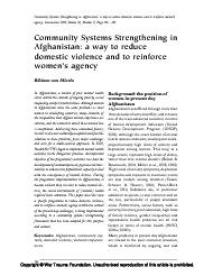Community Systems Strengthening in Afghanistan: a way to reduce domestic violence and to reinforce women’s agency
In Afghanistan, a burden of poor mental health exists within the contexts of ongoing poverty, social inequality, and persistent violence. Although women in Afghanistan share the same problems as most women in developing countries, many elements of the inequalities that Afghan women experience are extreme, and the context in which these women live is exceptional. Addressing these contextual factors, in order to discover culturally acceptable and feasible solutions to these problems, poses major challenges and asks for a multi-sectoral approach. In 2002, HealthNet TPO began to implement mental health activities in the Nangarharprovince. An important objective of the programme’s activities has been the development of community based, psychosocial interventions to enhance the population’s capacity to deal with the consequences of mental distress. During the programme implementation in Afghanistan, it became evident that, in order to reduce mental distress, the social determinants of (mental) health required more attention. This paper describes how a specific programme to reduce domestic violence, and to reinforce women’s agency within the context of the present day challenges, is being implemented according to a community systems strengthening framework that has been adapted for this purpose and context.
Geachte bezoeker,
De informatie die u nu opvraagt, kan door psychotraumanet niet aan u worden getoond. Dit kan verschillende redenen hebben,
waarvan (bescherming van het) auteursrecht de meeste voorkomende is. Wanneer het mogelijk is om u door te verwijzen naar de bron
van deze informatie, dan ziet u hier onder een link naar die plek.
Als er geen link staat, kunt u contact opnemen met de bibliotheek,
die u verder op weg kan helpen.
Met vriendelijke groet,
Het psychotraumanet-team.
Reference:
Bibiane van Mierlo | 2012
In: Intervention: the international journal of mental health, psychosocial work and counselling in areas of armed conflict, ISSN 1571-8883 | 10 | 2 | 134-145
http://www.interventionjournal.com/sites/default/files/VanMierlo_2012_Intervention_10-2.pdf
In: Intervention: the international journal of mental health, psychosocial work and counselling in areas of armed conflict, ISSN 1571-8883 | 10 | 2 | 134-145
http://www.interventionjournal.com/sites/default/files/VanMierlo_2012_Intervention_10-2.pdf


